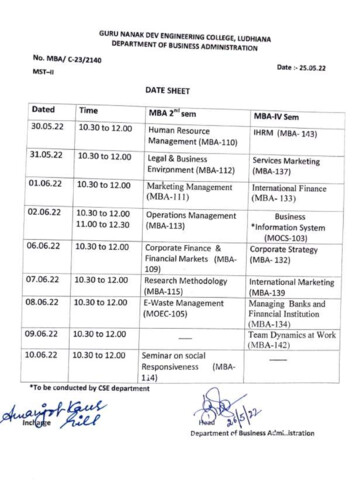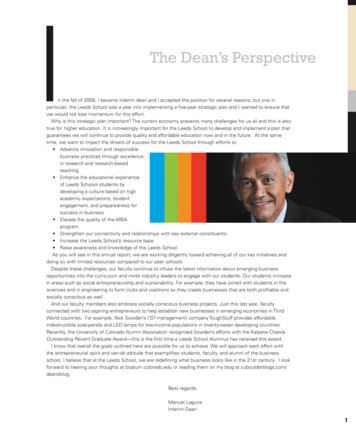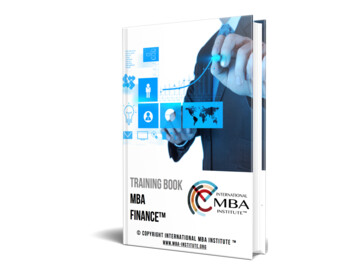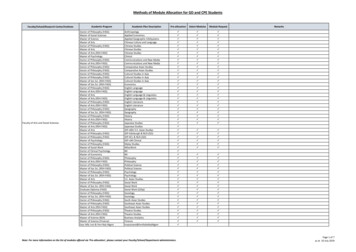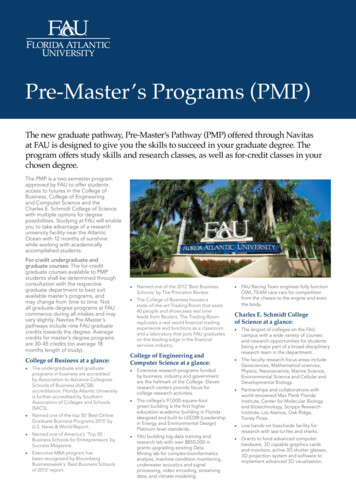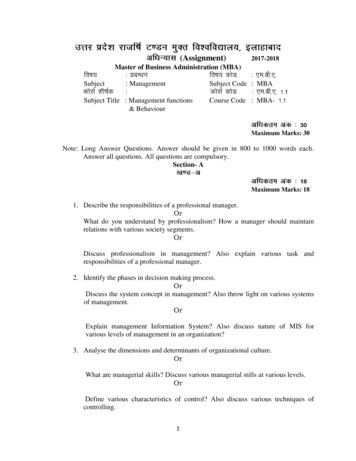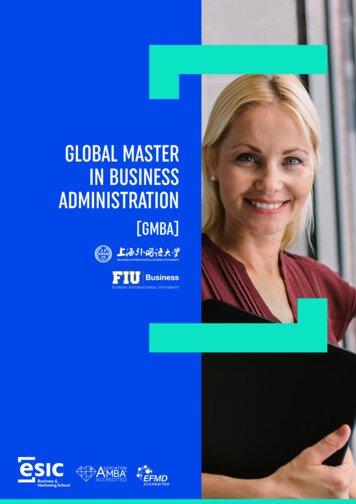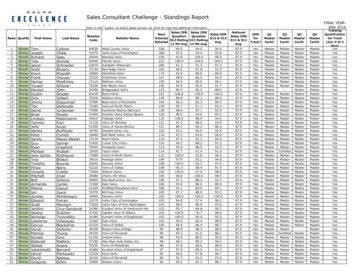
Transcription
Master of Business Administration(MBA)CurriculumFaculty of Management StudiesPokhara UniversityLekhnath, Kaski1
POKHARA UNIVERSITYMASTER OF BUSINESS ADMINISTRATION (MBA) PROGRAMIntroductionPokhara University, established under Pokhara University Act, 1997 aims to generate creativity andcapability of students. The Faculty of Management Studies (FMS) of Pokhara University has beenconducting the MBA and EMBA programs. The regular MBA is focused on full-time students whileMBA program offered in the evening is designed for students who are already working and would like topursue formal MBA degree. EMBA is a professional degree designed for working executives who want toupgrade and update their knowledge and skill base. This MBA curriculum has been designed on amodular format to be implemented over six trimesters. However, this curriculum can be extended up toeight trimesters for MBA programs offered in the evening.FMS’s major program objectives are as follows: To develop executives and managers for various areas of economic and social life of the countrywith a high level of competence.To develop management professionals and entrepreneurs with a global perspective.To enhance knowledge, managerial skills, and exposure of the practicing managers, executives,and entrepreneurs.To broaden the outlook of students by inculcating positive attitudes and by assisting them tobecome productive and responsible citizens of the world.MBA Program ObjectivesThe MBA program is designed to bring corporate change in Nepal through transformation of students intocompetent managers, executives, and entrepreneurs capable of becoming strategic change agents in thecorporate and social world. The program focuses on developing social and developmental outlook andadequate skill in analysis, decision-making, implementation, leadership, and communication among thestudents.The specific objectives of the program are as follows: To provide students a firm grasp of broad-based and integrated fundamentals of managementwith real-life applications. To develop professional managers who can effectively lead an organization in ahighly dynamic and competitive global business environment. To provide student-centered learning environment where students acquire modernmanagement skills, enhance their managerial capabilities, and adopt success-oriented, careerfocused attitudes.Program FeaturesThe features of the MBA program are competitive learning environment, market-drivenconcentrations, and program flexibility. The course requirements, duration, and other features of theprogram are as follows:i. The MBA program consist of a total of 66 credit hours comprising foundation courses, analyticaltool courses, core and functional area courses, integrative courses, concentration and elective2
courses. The program also includes two thematic graduate seminars and three workshops.Students also undertake Internship Project during the fifth trimester.ii. The regular MBA program is to be completed within six trimesters. The duration of eachtrimester will be 12 weeks excluding examinations. It can be run with a greater degree offlexibility. It may be run on full-time or part-time schedules. The concerned college/school maychoose a modality to run the program. The college/school is required to complete the mandatorycontact hours (12 hrs. for one credit) required by the program.iii. Graduates from all disciplines are eligible to join the program. However, the applicant must havea minimum of 15 years formal education (12 years of schooling plus three years of graduation).Furthermore, the applicant must have secured a minimum CGPA of 2.0 or 45 percent inBachelor’s level.iv. The program shall be run without a long vacation. The minimum time period required tocomplete the program is 24 months (six trimesters). The maximum time for completion of theprogram shall be four years from the date of registration.v. The program will use a range of pedagogical inputs that includes on-campus learning throughclassroom discussions, presentations, group work, case analysis and guest lecture series, and offcampus learning through project work, on-line instructions.Admission ProcedureEligibilityTo be eligible to apply for admission to the MBA program, an applicant must have a minimum of 15years formal education (12 years of schooling plus three years of graduation). Furthermore, the applicantmust have secured a minimum CGPA of 2.0 or 45 percent in Bachelor’s level. The final decision onadmission is taken on the basis of scores on the admission test, group discussions and interviews.Documents RequiredThe applicant is required to submit the following documents with the application form made available bythe concerned college/school by paying a predetermined fee: Completed and signed MBA application formLetter of reference from two refereesOfficial transcripts from all the academic institutions attended.Certificates of all degrees should be photocopied and submitted with proper attestation. Enrolment isconditional upon completion of all admission formalities including payment of all fees as determined bythe college. Incomplete applications shall not be processed.The Trimester SystemIn the program, each course has a certain number of credits assigned to it depending on its lecture, tutorialand practical work hours in a week. One lecture hour per week per trimester is assigned one credit. Thatis, a three-credit hour course has 36 contact hours.The prominent features of the trimester system are the process of continuous evaluation of a student’sperformance and the flexibility to allow the students to progress at a pace suited to his/her individualability, subject to the regulation of credit requirements.3
Academic Schedule and Course RegistrationThe academic session consists of four terms. However, admission to the program will only be given twicea year as per the schedule published by the Office of the Dean.Students are required to register courses at the beginning of each trimester. Since registration is a veryimportant procedural part of the credit system, all students must present themselves at the college.Registration in absence may be allowed only in rare cases at the discretion of the principal. A student’snominee cannot register for courses but will only be allowed to complete other formalities.Addition and Withdrawal from CoursesA student would have the option to add or drop from the course. This can, however, be done only duringthe first week of the trimester. A student wishing to withdraw from a course, should apply on theprescribed form within two weeks from the starting date of the trimester. A full-time student has to take aminimum of 10 credits in a trimester.Attendance RequirementsThe students must attain every lecture, tutorial and practical class. However, to accommodate for lateregistration, sickness and other such contingencies, the attendance requirements will be a minimum of80% of the classes actually held.Normal and Maximum Duration of StudyThe normal duration and the maximum duration for the completion of the requirements for the variousprograms are as follows:Normal duration: 24 months (6 trimesters)Maximum credit accumulation period: 4 1 years from the date of registration.(All the courses have to be completed within four years, and additional one year can be given tothesis work on special request upon the approval of concerned authority)Repeating a CourseA course may be taken only once for grade. Since passing of all courses individually is a degreerequirement, the student must reappear the failed courses when offered and must complete. Astudent will be allowed to reappear maximum of two passed courses to achieve a minimumCGPA of 3.0. The grade earned on the reappeared examinations will substitute the earlier gradeearned by the student in that course. A student can retake a course only when it is offered by thecollege/university.Evaluation SystemA student’s performance in a course is evaluated internally by the concerned faculty member andexternally by the Office of the Controller of Examinations (COE). Students are required to take trimesterend examinations. The first and the last trimester courses shall have a 60% weight on internal ongoingevaluation and a 40% weight on the external examinations. The trimester-end examinations of the firstand final trimesters shall be conducted externally by the COE.The college/school shall organize the evaluation of all core, functional, concentration, and electivecourses under the close supervision and monitoring by the COE and Office of the Dean. Detailedinstructions to this effect will be issued by the Office of the Dean. The college/school shall also beresponsible for evaluating the Internship Project, graduate seminar, practicum, and the Graduate ResearchProject.4
Students are required to take evaluations immediately after the completion of each module. Theconcerned colleges must submit marks secured by the students in each evaluation to the COE within twoweeks from the completion of the tests.The pass mark in each course will be a minimum Grade of C or GPA of 2.0. However, students mustsecure a minimum CGPA of 3.0 at the end of the program.Grading SystemPokhara University follows a four-point letter grade system. The letter grades awarded tostudents will be as follows:GradeAAB BBC CFGrade GoodFairPass in Individual CourseFailOnly in very rare and unusual circumstances, if a student cannot finish all the required works for thecourse, he/she may be awarded an incomplete grade ‘I’. If all the required works are not completed withinthe following trimester, the grade of ‘I’ will automatically be converted into ‘F’. The performance of astudent is evaluated in terms of the following index:The cumulative grade point average (CGPA) which is the grade point average for all completed trimesterand is given by:C GTTh o po t eoanalio nPAn o uo t c amf r c l e ob dDegree Requirements To graduate from the MBA program, a student should have a ‘C’ or better grade in each of thecourses as specified in the curricular structure section; completed all the courses, project work and internship as specified in the curricular structuresection within the maximum time period specified in the normal and maximum duration of thestudy section; have a final CGPA of 3 or better on the University’s 4.0 grade scale, and No outstanding financial obligations to the University.Distinction and Dean’s ListA student who obtains a cumulative GPA of 3.75 or better will receive the MBA degree with distinction.The Dean’s list recognizes outstanding academic performance in the FMS. To qualify to this list, astudent must have a CGPA of 3.80 or better.Credit Transfer and WithdrawalA maximum of 25% of the total credit hours of course work completed by a student in an equivalentprogram of a recognized university/institution may be transferred/waived for credit by the Dean on the5
recommendation of the principal/head of the school/college. However, for such transfer of credit, astudent must have received a grade of 'B' or better in the respective course. Courses taken more than twoyears earlier than the date of application will not be accepted for transfer of credit.Credit transfers will also be allowed from different programs of Pokhara University. In such cases, allcredits earned by students in compatible courses with a minimum grade of B may be transferred to thenew program.The student may apply for withdrawal from the entire trimester only on medical grounds. However,partial withdrawal from courses registered in a trimester will not be considered.Unfair MeansStudents are strictly forbidden from adopting unfair means in class assignments, tests, report-writing andfinal examination. The following would be considered as adoption of unfair means during examination: Communicating with fellow students for obtaining help. Copying form another student’s script/report/paper. Copying from disk, mobile, palm of hand or other incriminating documents and equipment. Possession of any incriminating documents, whether used or not. Any approach in direct or indirect form to influence teacher concerning grade. Unruly behavior which disrupts academic program.If the instructor detects a student using unfair means, the student may be given an ‘F’ grade at thediscretion of the Examination Board. Adoption of unfair means may result in the dismissal of the studentfrom the program and expulsion of the student from the college and as such from Pokhara University.Dismissal from the ProgramA student is normally expected to obtain a GPA of 3.0 in the trimester-end examinations of the MBAprogram. If a student’s performance falls short of maintaining this CGPA continuously over thetrimesters, he/she may be advised to leave the program or dismissed from the program.Curricular StructureThe MBA students are required to complete 27 courses, and four practicum and graduate seminars(equivalent to 66 credit hours). Students are required to complete 7 foundation and analytical tool courses(18 credits), 10 core and functional courses (20 credits), 2 capstone courses (6 credits), 4 concentrationcourses (8 credits), 2 electives (4 credits), and graduate research project, internship, seminars, and otherprojects (10 credits).The first trimester is focused on developing the foundation required for learning thecore/functional area and integrative courses. Students are required to attend classes in the collegeand take written examinations conducted by COE, PU to be held at the end of the first trimesterand the final trimester. However, for the evening MBA program, a separate course cycle will beannounced by the Office of the Dean.Term ISTT 501 Business StatisticsECO 511 Economic Analysis for BusinessIMS 521 Management Information SystemACC 515 Financial Reporting and Analysis(3.0)(3.0)(3.0)(3.0)6
Term IIMGT 541 Emerging Concepts in ManagementCOM 505 Managerial CommunicationSTT 502 Data Analysis for Decision ModelingECO 512 Macroeconomics and the Global EconomyMGT 542 OB and LeadershipCOM 506 Communication Skill Practicum(2.0)(2.0)(2.0)(2.0)(2.0)(1.0)Term IIIACC 516 Managerial AccountingFIN 531 Financial ManagementMKT 561 Marketing ManagementMGT 543 Human Resource ManagementRES 611 Business Research MethodologyIMS 522 e-Commerce: Practicum(2.0)(2.0)(2.0)(2.0)(2.0)(1.0)Term IVMGT 544 Entrepreneurship and InnovationMGT 545 International BusinessMGT 546 Operations and Service ManagementConcentration IConcentration IIMGT 547 Business Development Plan: Graduate Seminar(2.0)(2.0)(2.0)(2.0)(2.0)(1.0)Term VConcentration IIIConcentration IVElective IElective IIMGT 548 Internship(2.0)(2.0)(2.0)(2.0)(3.0)Term VIMGT 549 Business Environment AnalysisMGT 550 Strategic ManagementRES 612 Graduate Research ProjectMGT 551 Corporate Governance: Graduate Seminar(3.0)(3.0)(3.0)(1.0)Concentration AreasPokhara University offers several career-focused concentrations. These courses allow students to gainadditional knowledge and skills on specific concentration areas. The students are required to select anyfour courses from any one of the following concentration areas.Finance(4 courses of 2.0 credits each)FIN 632 Financial Institutions and MarketsFIN 633 Portfolio Management and Security AnalysisFIN 634 International FinanceFIN 635 Financial Derivatives and Risk ManagementFIN 636 Management of Capital Investment DecisionsFIN 637 Corporate Financing Decisions7
FIN 638 Working Capital ManagementFIN 639 Financial Restructuring StrategyMarketing(4 courses of 2.0 credits each)MKT 662 Service Marketing StrategyMKT 663 Marketing ResearchMKT 664 Consumer BehaviorMKT 665 Promotions ManagementMKT 666 Global MarketingMKT 667 Strategic Brand ManagementManagement Science and Systems(4 courses of 2.0 credits each)MSC 621 Business Processing Re-engineeringMSC 622 Total Quality ManagementMSC 623 System Analysis and DesignMSC 624 Optimization TheoryMSC 625 Decision Support SystemMSC 626 Supply Chain and Global OperationsMSC 627 Database ManagementMSC 628 Business SimulationHuman Resource Management(4 courses of 2.0 credits each)MGT 671 HRD StrategiesMGT 672 Compensation ManagementMGT 673 Career Development Strategies in HRMMGT 674 Employee Relations ManagementMGT 675 Performance ManagementMGT 676 International HRMMGT 677 Seminar in HRMGeneral Management(4 courses of 2.0 credits each)MGT 651 Organizational DevelopmentMGT 652 International ManagementMGT 653 Management Challenges in Emerging EconomiesMGT 654 Conflict Management and Negotiation StrategiesMGT 655 Managing for Quality ImprovementMGT 656 Knowledge ManagementMGT 657 Competitive StrategyMGT 658 Seminar in General ManagementElectives(2 courses of 2.0 credits each)8
The following courses have been identified for electives. These courses offer students the flexibility tocustomize their needs and meet their career interests and goals. These are basically sectoral andapplication courses which address the systematic integration across all of business disciplines. Hence, awide range of elective options may be offered by a college/school. A college/school can also develop andoffer such sector-focused elective courses with the prior approval of the Subject Committee and the Dean.MGT 681 Real Estate ManagementMSC 629 Management of TechnologyMGT 682 Tourism and Hospitality ManagementFIN 640 Insurance and Risk ManagementACC 630 Business Tax PlanningMGT 683 Project ManagementFIN 641 Bank Operations and ManagementMGT 684 Multinational ManagementMGT 685 Social EntrepreneurshipMGT 686 Strategies for Sustainable ManagementMGT 687 Management of Service Sector OrganizationsMGT 688 Productivity Perspective in Management DevelopmentMKT 668 Rural Marketing and AgribusinessECO 681 EconometricsECO 682 Monetary EconomicsInternship ProgramStudents are required to go for business exposure to assigned organizations for a period of 8 to 10 weeksunder the Internship Program. Students are required to present the Internship Project Report in theprescribed format. The evaluation of the Internship shall be based on confidential report of the hostorganization (40 percent) and presentation of the Internship Project Report in a seminar (60 percent).Graduate Research ProjectTowards the end of their study period, participating students are required to undertake a researchassignment and prepare an integrative research report in any areas of management as approved by thecollege/school. Students are required to attend the viva-voce examination and give a seminar presentationof their report as organized by the college/school. The weightage given for viva and the research reportwill be 25% and 75% respectively. For the evaluation of the research report, the college/school shallappoint internal and external examiners. The external examiner shall be appointed from the list approvedby the Office of the Dean.9
Course DescriptionsSTT 501 Business StatisticsThis course is designed to familiarize students with basic concepts in statistics. The contentsinclude the data analysis techniques, the study of probability and measures of uncertainty,discrete and continuous distribution, estimation, hypothesis testing, correlation and regressionanalysis, and the application of statistical methods for decision-making with emphasis onbusiness application. Throughout the course students will utilize the technology to gather,organize, and summarize the data into meaningful information. Further, students will apply thesoftware to draw inferences from the data so that appropriate decisions can be recommended.ECO 511 Economic Analysis for BusinessThis is an intensive course that stresses functioning of the market system. The purpose of thecourse is to investigate and analyze the theoretical and analytical tools of microeconomics, withemphasis upon their application to business decision-making. Topics include demand and supplyanalysis, decision theory, production and cost theory, market structure and competition, pricedetermination, competitive strategy, economies of scale and scope, employment of factors ofproduction, and profit strategies. What will be emphasized throughout this course are reasoningand problem-solving. Cases will examine how economic principles apply to the actual businessworld.IMS 521 Management Information SystemThis course is designed to provide a comprehensive knowledge to students to understand theimportance of information systems in managing business organizations. The course basicallydeals with the development, application, analysis and evaluation of the information system. Thecontents include basic concepts, information technologies, business applications, developmentprocesses, managerial challenges and ethical issues, strategic planning of information systems,and the use of information for competitive advantage. Appropriate application software will beused to get hands-on experience, to analyze cases, and to complete class projects.ACC 515 Financial Reporting and AnalysisThis is an introductory course in financial reporting and analysis. Accordingly, the key objectiveof this course is to provide students with the basic concepts and practices of financial reportingand analysis. It also aims to prepare students for specialization courses on accounting andfinance. First, it introduces the legal and practical aspects of financial accounting, handling oftransactions and preparation of financial statements. It then discusses the accounting anddisclosure of major components of financial statements. In the third module, the course coversthe concepts and practice of the analysis and interpretation of financial statements includinganalysis for investment in securities.MGT 541 Emerging Concepts in ManagementThe purpose of this course is to provide an overview of the emerging principles and concepts inmanagement. The course will cover current management theories and practices, managerial rolesand responsibilities, investigation and review of historical foundations and approaches,managerial functions of planning, organizing, staffing, directing, and controlling, and an10
understanding of human behavior and the impact of demographic diversity on organizations. Thecourse also defines the basic tasks of the manager in establishing the work environment, makingdecisions, setting objectives, goals and strategies, allocating resources, and executing programsto assure quality standards.COM 505 Managerial CommunicationThe purpose of this course is to develop communication skills as a strategic competence formanagers in organizations. The course amalgamates the business communication theories andpractices. Sensitizing the students how effective communication is critical for their professionaland personal life, the course covers some topics ranging from process and barriers ofcommunication to cross-cultural and non-verbal aspects of communication. Specific topicsinclude importance, process and barriers of communication; cross-cultural communication;holding meetings, negotiating with parties and conflict resolutions. The course also includesskills of working in teams and developing of interpersonal communication skills along with thestrategies involved in communicating with media. The instructor can incorporate other materialsstimulating the student’s desire to learn a wide range of issues because only with the habit ofreading they can develop life-long ability to communicate effectively. Students will makepresentations, have group discussions, involve in project works, and practice exercises forachieving the objectives set for this course.STT 502 Data Analysis for Decision ModelingThis course has two components: data analysis and decision modeling. Data analysis focuses onexploratory data analysis and multiple regression models to support management decisions.Topics in this component of the course include regression analysis and models, time seriesanalysis, and forecasting. Decision modeling of organizational systems uses mathematical andcomputer models to provide quantitative perspective on identifying, analyzing and solvingcomplex decision problems. Topics in this component of the course include linear programmingmodels and applications, sensitivity analysis, integer programming models, and network modelswith emphasis on business application.ECO 512 Macroeconomics and the Global EconomyThis course is intended to provide a foundation in macroeconomics. The course is intensive andintroduces students to macroeconomic theory and application as they pertain to the businessdecisions. Topics include measurement of GDP, inflation, monetary and fiscal policy, impact ofeconomic policy on the behavior of individuals and organizations, fluctuations and businesscycles, economic growth, employment issues, emerging global economic issues, and nature ofthe expanding global economy. All topics are discussed with emphasis on real-world application.Case studies and current economic trends and developments are examined in a globalperspective.MGT 542 Organizational Behavior (OB) and LeadershipThis course is designed to encourage the application of diverse conceptual and theoreticalperspectives to the analysis and control of behavior in organizations. The contents of the courseinclude the interaction between individual behavior in organization, group behavior inorganization, and organizational behavior in social systems. The study of individual behaviorpatterns, perception, superior-subordinate relations, group dynamics, communication,11
interpersonal relationships and conflict, motivation, decision-making, leadership behavior andstyles, team leadership, ethics and values in leadership, formulation and implementation ofchange and development strategies, managerial stress and the impact of demographic diversityon organizations will be covered.COM 506 Communication Skills PracticumThis course focuses on writing and oral presentation skills of the students. Practices includewriting memos, letters, reports and proposals. At the completion of the course, students shouldhave skills in correct, effective and professional writing, and make powerful oral presentations.ACC 516 Managerial AccountingThe course helps to understand the concepts, tools and techniques of management accountingand controllership functions; measuring income under different techniques for analyzing,decision-making, planning and controlling activities of an organization. Topics covered includemeasurement, presentation, interpretation, and communication of economic information formanagerial functions. Students will be acquainted with activity-based costing, CVP analysis,decision regarding alternative choices, pricing products and services, capital investment models,planning profit through budgets, controlling direct material, direct labour and factory overheads.The course uses case studies and practical exercises to emphasize the application of concepts.FIN 531 Financial ManagementThe aim of this course is to familiarize students with an overview of the principles, methods andpractices of financial decision making in firms. Major topics that will be covered include:Nature of financial management: finance in organizational structure of the firm, valuemaximization goal as a financial decision criterion, financial functions and agency problems.Financial management concepts: financial statements and cash flows, time value of money;Financial planning and forecasting: the financial plan, financial statement forecasting, the AFNformula and simple regression technique. Securities valuation: bond and stock valuation.Strategic investment decision making: estimation of cash flows, estimation of cost of capital,evaluation of cash flows. Strategic financing decision making: operating and financing leverage,EBIT-EPS analysis, breakeven and indifference charts. Dividend policy decision making: natureand types of dividend policy, determinants, stock dividends and stock splits.MKT 561 Marketing ManagementThe course aims to develop a strategic perspective of students in marketing management. Itbuilds students’ capabilities in analyzing marketing opportunities, developing marketingstrategies, and designing implementation plans and programs. This course includes businessstrategy and sustainable competitive advantage; concept and relevance of strategic marketmanagement; analysis of external and internal factors for opportunity identification; formulationof strategy for sustainable competitive advantage; differentiation and positioning strategies;growth and diversification strategies; strategies for the global market; preparation of strategicmarketing plan and program formulation; and strategic control.MGT 543 Human Resource ManagementThe purpose of this course is to provide students with the knowledge and skills needed to workeffectively with human resources to enhance the contributions of all employees to organizational12
effectiveness. This course identifies and defines the role of key functional areas of humanresource and examines how these areas support management. The course takes a strategicapproach and examines how human resource functions such as recruitment, selection,performance appraisal, career development, promotion of personal skills, work-family conflict,and compensation can impact organizations’ productivity and success. The course underscoresthe need to understand the dynamic nature of human resources in organizations. It highlightsprofessional handling of human resource through process of setting objectives and standards,measurements of results, policies, periodic job analysis to identify variances in requirements ofattitude, skills, and knowledge in existing and redesigned jobs.RES 611 Business Research MethodologyThis course is devoted to develop an understanding and skills of research in students. The coursedeals with the tools, techniques, and the changing paradigms of social science research, and theirapplication to
The regular MBA is focused on full-time students while MBA program offered in the evening is designed for students who are already working and would like to pursue formal MBA degree. EMBA is a professional degree designed for working executives who want to upgrade and update their knowledge and skill base. This MBA curriculum has been designed on a
